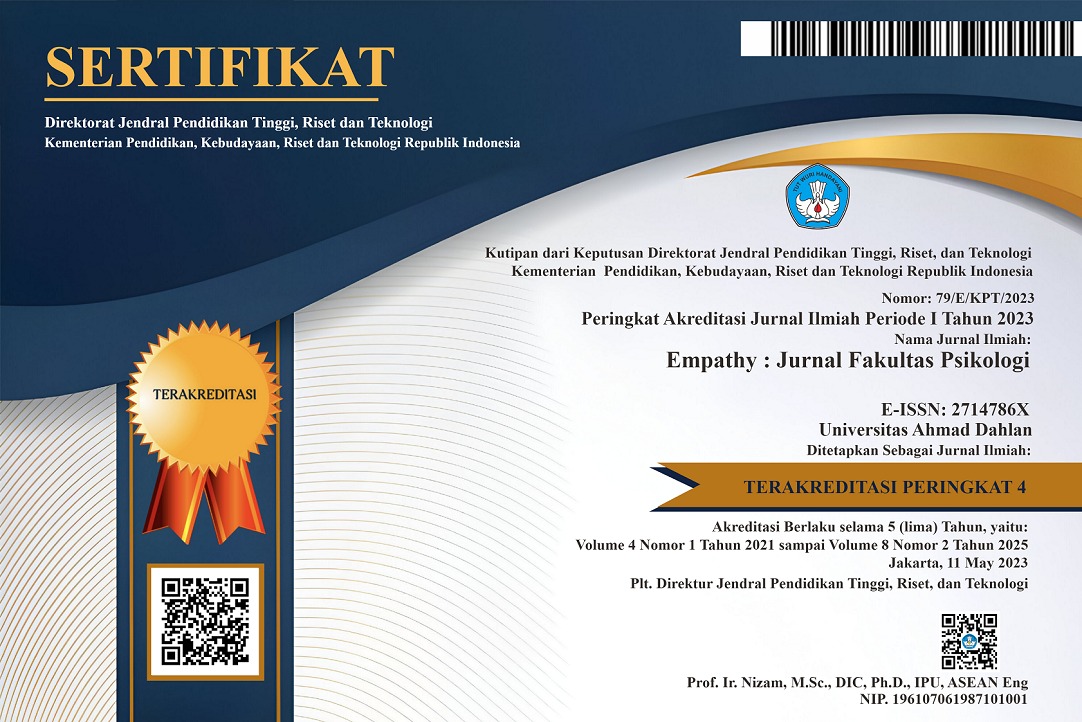Pelatihan Positive Self-talk untuk Meningkatkan Kepercayaan Diri pada Mahasiswa
DOI:
https://doi.org/10.12928/empathy.v4i1.20353Keywords:
Self confidence, Students, Positive self-talk trainingAbstract
Positive Self-talk Training to Increase Self Confidence of Students
New students are oftentimes required to able adapting to new environments and become more creative, and also independent. This makes some students feel a lack of confidence in their capabilities. This study aimed to determine the effect of positive self-talk training to increase self-confidence in students. The research method used is a quasi-experimental quantitative method with a pretest-posttest control group design. The subjects in this research were 14 people of Yogyakarta universities with a semester range from the first semester until the third semester. Subjects were divided into two groups, experimental group, and control group. Data analysis was used Wilcoxon and Mann-Whitney U tests. Wilcoxon tests, the results obtained were p=0.027 and z=-2.207, meaning that there was a significant difference in self-confidence assessment before and after treatment. Meanwhile, Mann Whitney U test resulted in p=0.014 and z=-2.464, meaning that there was a significant difference in self-confidence scores between the experimental group and the control group.References
Asrori. (2020). Psikologi pendidikan pendekatan multidisipliner. Banyumas: CV Pena Persada.
Bidjuni, H. (2016). Hubungan kepercayaan diri dengan penyesuaian diri pada mahasiswa baru di Program Studi Ilmu Keperawatan Fakultas Kedokteran Universitas Sam Ratulangi Manado. Jurnal Keperawatan, 4(2).
Ernawati, R. (2017). Hubungan antara kepercayaan diri dengan penyesuaian diri siswa paket BDI kampus Diakonia Modern Jatiranggon, Jatisampurna Kota Bekasi. JDP, 10(1), 61–80.
Ganda, Y. (2004). Petunjuk praktis cara mahasiswa belajar di perguruan tinggi. Jakarta: Gasindo.
Hadilinatih, B., Irjanto, B., Nurhadi, & Effendi, C. (2019). Peluang dan tantangan dalam peningkatan kompetensi aparatur pemerintahan desa melalui pelatihan berbasis online. Temu Ilmiah Nasional Balitbang. Surabaya.
Hardy, J. (2019). Speaking clearly: A critical review of the self-talk literature. Psychology of Sport and Exercise, 7, 81–97.
Indraharsani, S., & Budisetyani, W. (2017). Efektivitas self-talk positif untuk meningkatkan performa atlet basket. Jurnal Psikologi Udayana, 4(2), 367–378.
Karyanti, T., Prihati, Y., & Galih, S. T. (2019). Pendidikan anti korupsi berbasis multimedia (untuk perguruan tinggi). Yogyakarta: Deepublish.
Komara, I. B. (2016). Hubungan antara kepercayaan diri dengan prestasi belajar dan perencanaan karir siswa. Psikopedagogia, 5(1), 33–41.
Lauster, P. (2003). Tes kepribadian (alih bahasa D.H Gulo). Jakarta: Bumi Aksara.
Permatahati, F., & Noorrizki, R. D. (2019). Gambaran kepercayaan diri mahasiswa rantau di Universitas Negeri Malang. Psikologi Sosial, 269–272.
Ramadhani, T. N., & Putrianti, F. G. (2014). Hubungan antara kepercayaan diri dengan citra diri pada remaja akhir. SPIRITS, 4(2), 22–30.
Santoso, S. (2010). Statistik nonparametrik. Jakarta: PT Elex Media Komputindo.
Setyobroto, S. (2001). Mental training. Jakarta: Solo.
Suseno, H. (2018). Pentingnya rasa percaya diri dalam menghadapi era globalisasi. Retrieved July 8, 2020, from Kompasiana website: https://www.kompasiana.com/xharsen/5b5e5962ab12ae2cb36cd662/pentingnya-rasa-percaya-diri-dalam-menghadapi-era-globalisasi
Syam, A., & Amri. (2017). Pengaruh kepercayaan diri (self confidence) berbasis kaderisasi IMM terhadap prestasi belajar mahasiswa (studi kasus) di Program Studi Pendidikan Biologi Fakultas Keguruan dan Ilmu Pendidikan Universitas Muhammadiyah Parepare. Jurnal Biotek, 5(1), 87–102.
Wulaningsih, I. (2016). Efektivitas positive self talk terhadap motivasi belajar siswa kelas IX SMP. E-Jurnal Bimbingan Dan Konseling, 12, 549–556.
Downloads
Published
Issue
Section
License
Authors who publish with Empathy: Jurnal Fakultas Psikologi agree to the following terms:
- Authors retain copyright and grant the journal right of first publication with the work simultaneously licensed under a Creative Commons Attribution License (CC BY-SA 4.0) that allows others to share the work with an acknowledgment of the work's authorship and initial publication in this journal.
- Authors are able to enter into separate, additional contractual arrangements for the non-exclusive distribution of the journal's published version of the work (e.g., post it to an institutional repository or publish it in a book), with an acknowledgment of its initial publication in this journal.
- Authors are permitted and encouraged to post their work online (e.g., in institutional repositories or on their website) prior to and during the submission process, as it can lead to productive exchanges, as well as earlier and greater citation of published work.

This work is licensed under a Creative Commons Attribution-ShareAlike 4.0 International License.



